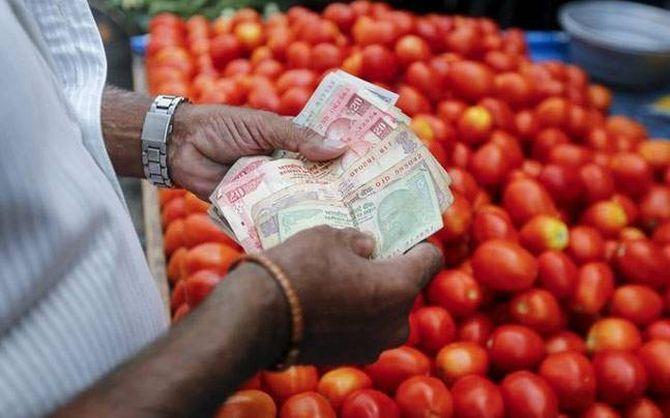Trade sources believe that tomato supply from Maharashtra has slumped due to incessant rain in the state towards the fag end of the monsoon season, reports Dilip Kumar Jha.

Tomato prices have doubled in the last one month after supply reduced from Maharashtra, owing to incessant rains across major growing regions.
Maharashtra is one of the largest growers of tomato.
Data compiled by Nashik-based National Horticultural Research & Development Foundation (NHRDF) showed an almost 100 per cent increase in tomato model prices in September to Rs 24 a kg from Rs 14.50 a kg in the beginning of the month.
Meanwhile, stockists ramped up supply to take advantage of the price rise.
Thus, total tomato arrivals jumped to 519 tonnes towards the end of September from 368 tonnes in the beginning of the month.
Similarly, the price of tomato in Mumbai jumped to Rs 25 a kg on Thursday from Rs 16.50 a kg early September. In Mumbai, the Agriculture Produce Market Committee (APMC) said onion arrivals declined to 378 tonnes on Thursday as compared to 417 tonnes in the beginning of September.
Trade sources believe that tomato supply from Maharashtra has slumped due to incessant rain in the state towards the fag end of the monsoon season.
Farmers in Maharashtra feed tomato during the September-October period to the entire country with their early kharif variety crop. It is followed by the seasonal kharif crop from Andhra Pradesh, Karnataka, Madhya Pradesh and Gujarat.
“Tomato arrivals have declined sharply from Maharashtra which led to a sharp surge in prices in the wholesale mandis. Farmers have reduced supply due to water logging in the fields. Rain in the last few weeks paralysed harvesting and thus, transportation of tomato,” said Shyam Lal, deputy secretary, Azadpur APMC.
Tomato sowing was delayed this year due to a three-week delay in the onset of the monsoon.
The vegetable’s planting was disrupted due to lack of soil moisture. Following that, the uneven distribution of the monsoon hampered sowing with drought in the initial phase in some major growing regions of the state.
Again, tomato farming was affected by two rounds of floods across the state.
“There was a huge crop loss across Maharashtra. Delay in sowing resulted in the proportionate delay in harvesting. While farmers are preparing to harvest the pre-matured crop, continuous rain across the state has eroded prospects to cash in on the higher tomato prices,” said Shivaji Pandurang Chubhale, chairman, Nashik APMC.
Interestingly, quality of the current harvested crop is also poor with high moisture content, thereby reducing the shelf life amid fears of spoilage.
Meanwhile, tomato processors, including chips and ketchup makers, have deferred their fresh purchases at this price. These large corporates normally purchase good quality tomato for future use. “There is no order from large buyers at this price. They fill their cold storage during peak arrivals when prices fall sharply,” said a large tomato supplier in Vashi, near Mumbai.
Photograph: Reuters.











 © 2025
© 2025